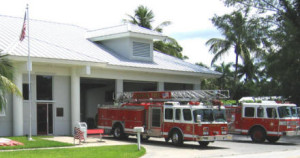Should You Buy a Home Close to a Fire Station in Florida?
When you’re looking for a new place to live, moving close to a fire station has both pros and cons. Essentially, the cost-benefit analysis comes down to two factors: noise and response time to an incident. Let’s discuss the noise issue first. Fire  trucks are…loud. Truck operators blare their siren/horn in order to alert oncoming traffic that the truck is entering the street and to warn motorists to get out of the way, so that the truck can get to the accident scene as quickly as possible. Individual city noise ordinances vary, but in most cases fire trucks activate their sirens as they are leaving their station, regardless of the time of day. Therefore, you can safely assume that the fire station near your home will make noise and you will simply have to deal with it. Resident annoyance due to sirens/horns is not a major concern for the folks who are fighting fires and saving lives. Since you can expect noise, the operative question becomes how much?
trucks are…loud. Truck operators blare their siren/horn in order to alert oncoming traffic that the truck is entering the street and to warn motorists to get out of the way, so that the truck can get to the accident scene as quickly as possible. Individual city noise ordinances vary, but in most cases fire trucks activate their sirens as they are leaving their station, regardless of the time of day. Therefore, you can safely assume that the fire station near your home will make noise and you will simply have to deal with it. Resident annoyance due to sirens/horns is not a major concern for the folks who are fighting fires and saving lives. Since you can expect noise, the operative question becomes how much?
In order to answer this question, you need to ask a couple more. First, how many fire stations are in your community? Have a look at our MoveMap to see the number of fire stations in your area. If you live in a sprawling suburb and there is only one fire station, you can bet that it’s going to be fairly busy. On the other hand, if the fire stations are distributed evenly throughout your area, you can expect less noise. Next, inquire if the fire station is full time or part time. Additionally, ask whether the station just responds to fires or if it offers emergency medical support as well. In Florida, fire stations do much more than just fight fires, so knowing which events the station responds to is crucial to determining how busy it will be. If you’ve got a couple of hours to kill you can always sit outside and observe or ask the neighbors. This will provide a little firsthand experience to supplement answers to the above mentioned questions.
Although fire stations can present noise problems for some people, living close to them offers benefits as well. The most obvious among these is reduced response time to an incident. While incident response time depends on many factors, such as the amount of traffic, time of day, and staffing level, residents living close to a fire station can generally expect faster service in the event of an emergency. In fact, folks that live sufficiently close can have lower insurance premiums than their more distant peers! Insurance breaks aside, proximity to a fire station or hospital is an important factor for elderly persons and those with unpredictable medical conditions. A more esoteric, but still important factor to consider is simply the peace of mind that comes with knowing that if an emergency occurs, help is only a few blocks away. Finally, Florida is prone to hurricanes and emergency response centers like fire stations have a very high priority when it comes to repairing the electric grid. If your home happens to be on the same part of the grid as the fire station, you can expect to get your power (and therefore, air conditioning) back more quickly than your neighbors.
So we’ve established that living very near a fire station presents both benefits and costs. Whether or not you should live close to one depends on your unique situation. Anecdotally, most people say that they get used to the truck noise and that it doesn’t wake them up at night or bother them all that much. However, if you plan to resell you home in the future you should take time to consider the perceived impact proximity to the station will have on your home value/time on market. While no definitive study has been done (to our knowledge), the common perception is that living close to a noise source like a fire station can negatively impact home values. On the other hand, close proximity can actually be a selling point for people with certain medical conditions or concerns about fast emergency response time. We encourage you to check out our MoveMap and take a look at how close your prospective home is to a fire station. Then consider how much things like noise and response time matter to you.

